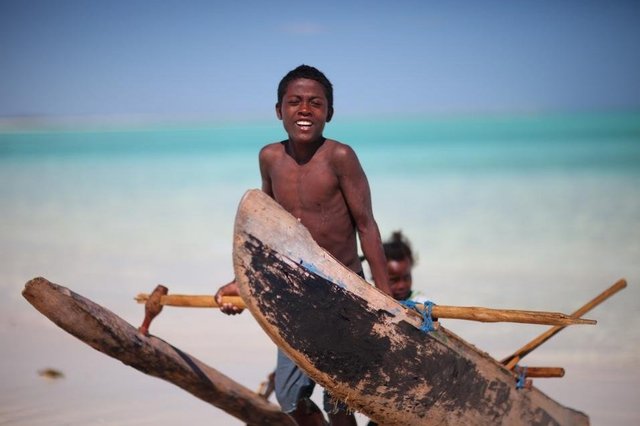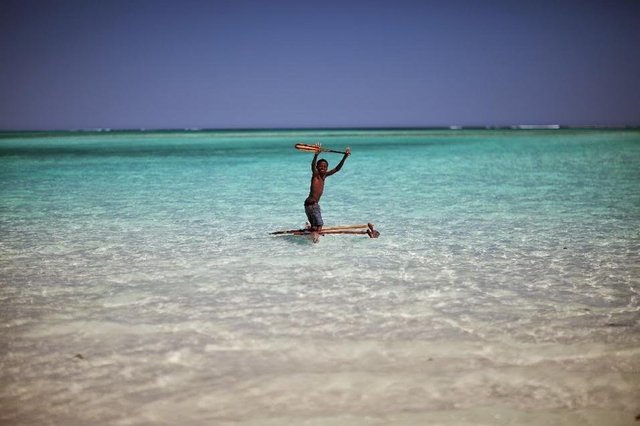Peter, a life without school - Part 1, by @terresco (translated from French)
This is an authorized translation in English of a post in French by @terresco: Peter, une vie sans école - Partie 1
As my primary language is not English, there are probably some mistakes in my translation.
Remember that the person who speaks here is NOT me, Vincent Celier (@vcelier), but @terresco, a French guy.
My recent article on the School of Sand Seeds (école "Graines de sable") in the southwestern Malagasy, brought my thoughts back to my former employee, who became a friend, Peter. I had already written an article about him a few months ago to explain some points of his culture. It's not writing that made me think of him, I never forgot Peter. I search and send news whenever I can. Through the Sand Seeds I saw him as a child, imagining what his life might have been, had he had this educational chance in his day. This brings me irresistibly, if I can not write to him directly, to talk a little about him giving myself the illusion of reliving some good times we spent together.
A childhood probably happy
Peter was born at the edge of the ocean, on the banks of the Mozambique Channel to be precise, in an isolated region of southwestern Madagascar. His father had found a job as a guardian for land bought by a Frenchman living in Reunion Island. The land, at the edge of the lagoon, is beautiful but extremely isolated. The Réunionese showed up there only a few times a year for a few days of vacation. The work was not very intense, all in all there was not much to keep. The family settled there, coming from different ethnic groups they were nevertheless accepted little by little.

Thanks to a little family in Tuléar (now called Toliara), the nearest town, probably thanks to the financial help of his boss and some healing talents that Peter's father had developed, I do not know how, the parents sent their children to school. Something rare enough in these countries to be underlined. Obviously the follow-up was distant, the pedagogy had its faults, the numerous absences, but all the children of the couple attended the school. For that they had to leave the family when they were around 6 or 7 years old to settle in Tuléar. Although only 40 kilometers as the crow flies, they could only return for the holidays.
Peter was the third born, but also the first boy. It gave him a responsibility and a slightly different status. He left for Tuléar when he was 7 years old, but he had to go back to assist his father at the age of 11 or 12 years. His schooling, if one can say, was summed up at 3 or 4 years. Peter did not know how to read or write. Who could have done it under these conditions? On the other hand, he became resourceful, he did all the odd jobs over the opportunities or necessities. He planted with his father, tinkered on the ground, fished with the Vezo, one of the main ethnic groups of the region ...

An unexpected meeting
It was around the age of 17 that he saw, one fine morning, a little white man start to build his wooden house on a lot next to his own. Curious and open-natured, Peter spent each day looking, helping, chatting a bit. He spoke very little French, and the little white man, myself in this case, had no idea of the Malagasy language, much less of the dialects of the south. However, over the days and difficulties of installation, Peter became a guy we liked to see coming. Always smiling, never desperate about a problem, he always had a solution to offer and to try.
Lost on a beach there are many more tasks to perform, just to cope with everyday life, as we imagine. Of course, we suggested Peter work for us. No special task, it was part of the house. He was obviously waiting for this proposal and agreed two seconds later. We trusted him immediately and never had to repent. My wife gave him some French lessons and we developed, without really wanting it, our own way of understanding, composed of a mix of French, Malagasy, Vezo words and the habit of being together.
Thus, to begin our common history which was to last three years, the duration of our stay in Madagascar. A slice of life that Peter has largely contributed to make unforgettable. A rewarding experience on many levels but it's not our story but Peter's story that I'll finish in the next article.
Continue to Part 2
-- @terresco
School life is always happines and also glad life. Support please boss @vcelier
Posted using Partiko Android
Lol.. Really nice and interesting, waiting for the next episode. Maybe peter's encounter with the white man will change his story all through.